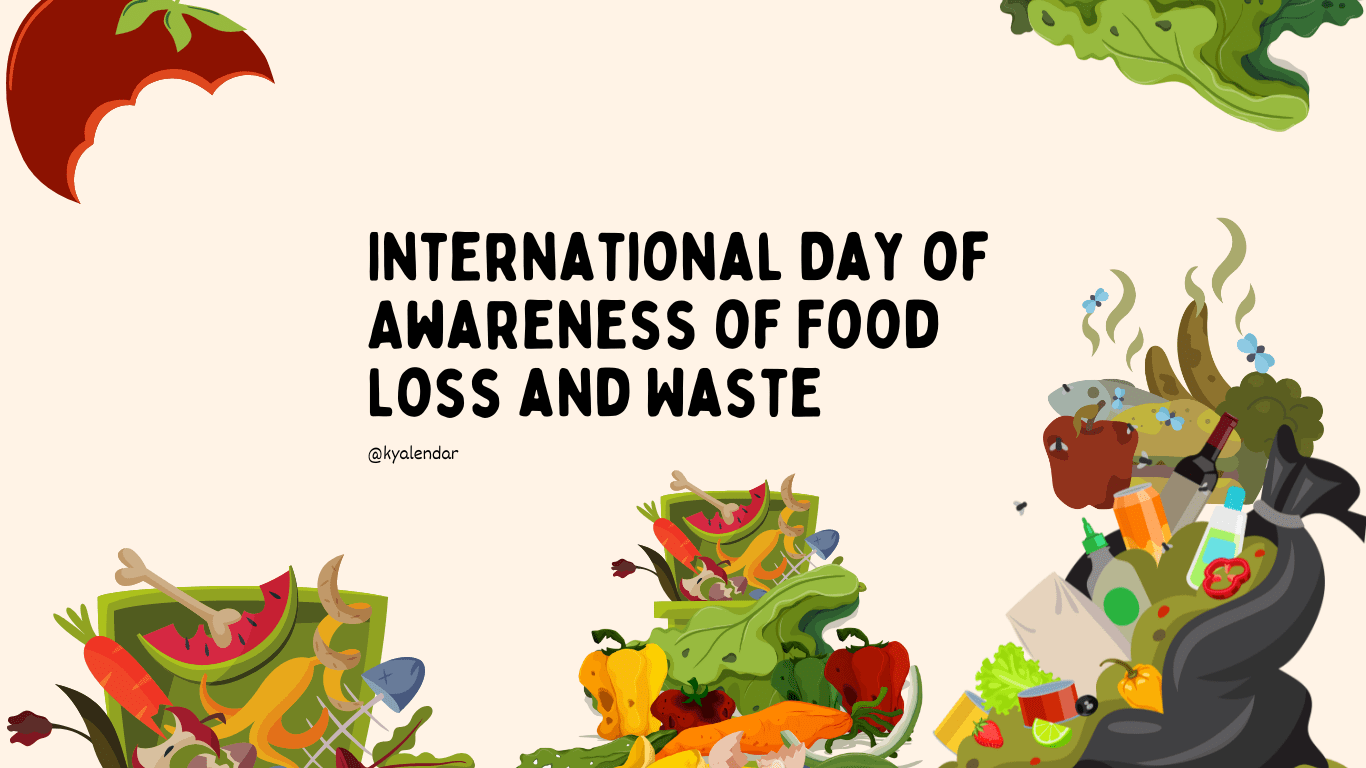
- This event has passed.
International Day of Awareness of Food Loss and Waste
September 29

The International Day of Awareness of Food Loss and Waste is observed annually on 29th September. This day serves as a global platform to raise awareness about the critical issue of food loss and waste, which has significant implications for food security, climate change, and sustainable development. By highlighting the scale of the problem and encouraging actions to reduce food loss and waste, this day plays a pivotal role in promoting more sustainable food systems.
The Importance of Reducing Food Loss and Waste
Food loss and waste occur at various stages of the food supply chain, from production and processing to distribution and consumption. Food loss refers to the reduction in the quantity or quality of food resulting from the decisions and actions of food suppliers along the chain. In contrast, food waste typically occurs at the retail and consumer levels, where edible food is discarded.
The United Nations estimates that nearly one-third of all food produced globally is lost or wasted. This is a staggering figure, especially considering the millions of people who suffer from hunger and malnutrition around the world. Reducing food loss and waste is therefore essential not only for feeding a growing global population but also for reducing the environmental impact of food production.
Environmental Impact
The environmental consequences of food loss and waste are profound. When food is wasted, so too are the natural resources used to produce it, including water, energy, and land. Moreover, food waste in landfills generates methane, a potent greenhouse gas that contributes to climate change. By reducing food loss and waste, we can significantly reduce the environmental footprint of the food system and contribute to global efforts to combat climate change.
Economic and Social Implications
Food loss and waste also have significant economic implications. For farmers, food loss means a loss of income, as produce that could have been sold is instead discarded. For consumers, food waste represents money spent on food that is ultimately thrown away. At a broader level, the economic cost of food loss and waste is estimated to be in the trillions of dollars annually.
Socially, reducing food loss and waste can help address issues of food insecurity and inequality. Redistributing surplus food to those in need, for example, can help alleviate hunger while reducing waste. This is particularly important in regions where access to food is limited and malnutrition is prevalent.
Strategies to Reduce Food Loss and Waste
Reducing food loss and waste requires coordinated action at all levels of the food supply chain. Here are some strategies that can be implemented to tackle this issue:
- Improved Storage and Transportation: In many developing countries, inadequate storage facilities and poor transportation infrastructure lead to significant food losses, particularly of perishable goods. Investing in better storage solutions and more efficient transportation can help reduce these losses.
- Sustainable Agricultural Practices: Farmers can adopt practices that minimise post-harvest losses, such as using improved harvesting techniques and investing in better packaging to extend the shelf life of produce.
- Consumer Awareness and Behavioural Change: At the consumer level, reducing food waste often involves changing behaviours and attitudes towards food. This includes planning meals more carefully, understanding food labels better, and being creative with leftovers.
- Policy Interventions: Governments can play a crucial role in reducing food loss and waste by implementing policies that encourage food recovery and redistribution, setting food waste reduction targets, and supporting research and innovation in food preservation technologies.
- Private Sector Engagement: Businesses, particularly in the retail and hospitality sectors, can implement measures to reduce food waste, such as donating surplus food to charities, improving inventory management, and offering smaller portion sizes to reduce plate waste.
Global Efforts and the Role of International Day of Awareness of Food Loss and Waste
The International Day of Awareness of Food Loss and Waste was established by the United Nations General Assembly in 2019 as part of the broader efforts to achieve the Sustainable Development Goals (SDGs), particularly SDG 12, which focuses on ensuring sustainable consumption and production patterns. The observance of this day underscores the importance of international cooperation in addressing the issue of food loss and waste.
Various events and activities are organised globally on this day to raise awareness and inspire action. These may include conferences, workshops, and campaigns aimed at educating the public and stakeholders about the impact of food loss and waste and the steps that can be taken to reduce it. The day also provides an opportunity for governments, businesses, and civil society organisations to showcase their efforts and share best practices.
Conclusion
The International Day of Awareness of Food Loss and Waste is a crucial reminder of the need to address the issue of food loss and waste at all levels of the food supply chain. By raising awareness and promoting action, this day contributes to the global effort to create more sustainable food systems, reduce hunger, and mitigate the environmental impact of food production. As individuals, businesses, and governments, we all have a role to play in reducing food loss and waste, ensuring that the food we produce is used to its fullest potential and that no one goes hungry unnecessarily.